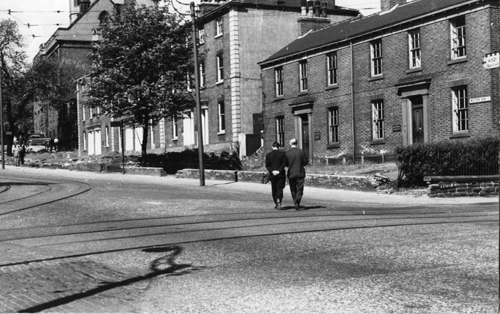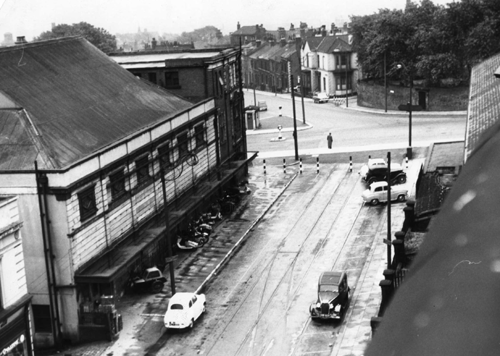Gregorio Weber: A friendship renewed at Sheffield in 1952-53
by Quentin H. Gibson

Gregorio was a friend perhaps more than a colleague and we continued to meet quite often after we moved to the US. My wife, Jane had known him in his Cambridge days and we renewed the acquaintance at Sheffield in the 1952-53 Session, when Gregorio was appointed by Krebs. We saw him last I suppose in the fall of ‘96. His Leukaemia had been going for some time so on our way back from Rice to NH we made a stop in Urbana.
Quentin Gibson 1918-2011
We wanted, in any case, to see Ralph Wolfe whom had been a visitor to Sheffield in Dr. Elsden's laboratory, in the 1960-61 Session. Gregorio was quite cheerful and resigned and chatted through dinner. He was still driving then. We had coffee with him the following morning - he had a regular buddy who was in the very high pressure business and who had collaborated with him. This was a pleasant occasion indeed, though I cannot remember the name of his buddy who has probably died - at least he is not in the geographic listing of the National Academy.
Gregorio had married Shirley Nixon the daughter of an economist who had worked for the League of Nations in Geneva until the outbreak of the war. She was a lively extroverted person much interested in art and a constructor of collages. They had three children: The eldest, Alicia was exceedingly lively, particularly physically - my engram shows her skipping at a great rate. She failed the 11+ and this may have had some influence on Gregorio’s deciding to leave Britain. The second, Rosamund had sepcial educational needs. Julia was a highly intelligent child. Gregorio came near to never mentioning his family - Alicia and Julia were marginally in the movie business but in NYC, not LA.
My version of what caused the break up of the Biochemistry Department at Sheffield goes like this. I had the highest opinion of Gregorio as a scientist as well as liking him and sought to advance him in every possible way, having succeeded in having him made Reader - a bit of a problem because Howarth, the Professor of Chemistry, tried to stop it (asking if he spoke English sufficiently well). It was clear, however, that, even as his reputation grew, this was not going to be sufficient and I agitated to have him made Professor of Physical Biochemistry. I thought I had this lined up before leaving for my sabbatical in the US in 1961.



Western Bank 1952
Scala Cinema and Winter Street 1955
Sheffield University 1960
On my return, I found that Elsden, an important cog, had thought better of it. He probably thought I should have been pushing his promotion to become Professor of Microbiology. Anyway, the funds were used to set up a Chair for Alice Garnett, an aging geographer.
Parenthetically, Gregorio, Vince Massey and I successively held what we called the Ed Lennox fellowship at Urbana. Ed had been an Associate Professor there,resigning to go to La Jolla. Irwin Gunsalus was then the Head of the Biochemistry section of the Chemistry Department in Urbana and decided not to refill the post but to divert the funds to support a visitor. Ed, about the same age as us, had a seminar called "Up Watson Crick without a Paddle" featuring the secret of life, a large spiral with dollar bill nucleotides. He quit work at an early age and it was rather sad to spend an evening with him and his wife at Woods Hole.
Meantime, American offers began to come in, mediated by Woody Hastings who was also at Urbana at the time. I was quite unable to manage a counter offer, the Vice Chancellor "Jolly Jack" (J.M.) Whittaker in honour of his gloomy persona, advising me that it was useless to expect good people to stay in a third-rate University like Sheffield. The best one could hope for was that they might use it as a stepping stone to better things. He did not put it in quite so many words, but his own intention was to use Sheffield as a step on the way to the Mastership of a small Cambridge College. I was infuriated by this and by the clear implication that I could not possibly be any good. Vince, Theo Hofmann and I floated our availability on the US market (there were many many jobs post- Sputnik); Gregorio accepted Urbana, and Vince went to Ann Arbor, Theo to Toronto and I went to Britton Chance's laboratory in Philadelphia. Almost end of story - Jolly Jack found a strong desire to return to research and resigned a few months later.
By hindsight I do not think the group could have been kept together in the prevailing structure. I was helped to quit myself by having been deputy dean of t he faculty of science, and the imminence of three years as Dean. The waste of time was just too much to bearI don't know about its relevance, but Gregorio’s years with U-V light had induced cataracts. One of these was evulsed in Sheffield not very successfully, and a retinal detachment followed. At the time the best treatment was offered by a surgeon called Foulds who was in Cambridge - a Scot, he later moved to Glasgow. He threaded a suture through the eye to induce scar tissue formation and so anchor the retina. Gregorio had to keep perfectly still for two weeks in the dark and he was gloomy when I visited him after the op. His second eye was done in the US. He required thick lenses of course. His U-V range was extended and he could readily see the 366 Hg line.
In Urbana he bought a house on Professor’s row (Delaware Avenue) that Shirley furnished with Victorian knickknacks - she had decided this would be the coming thing. In reality, she was ahead of her time and her furnishings were regarded as ridiculous. She was not happy there and I suppose it contributed to the break up of their marriage. Gregorio never mentioned it except to say once that he had "fulfilled his biological function" and that there was no point in preserving the marriage. Shirley now lives in a home for the elderly.
Anecdotes are hard to come by. One time Gregorio came to visit us in Woods Hole. It rained like stink all day and we just sat and talked. When it became time for dinner, a daughter of ours said she didn't want to come with us - we had talked science all day. So we promised to do better and she relented. When we came home I said, "Well how did we do? - we never talked science at all." “No”, she replied, “you didn't, you just talked science people instead.”
Gregorio was a terror about getting forms filled in time so I always sent him his copy about 3 weeks before the rest of the faculty. About the time the others went out I began badgering Gregorio to return his. At one point he visited us in NY - there was some political convulsion in Urbana and he expected to become the new Chairman. I pressed him as strongly as I could not to do this but he said he thought he might be able to "make a difference." He lasted all of six months before being pressed to resign.
Gregorio was much better theoretically than practically. This was a disadvantage in Sheffield where design really devolved on him alonewhere, despite excellent workshop support, initial optical design. Indeed, some of the devices he tried to elaborate never progressed to the state of user friendliness where they would be considered for commercial development. He did much better in the US where there were more mechanically-minded people than in England - part of the misguided attitude that a scholar does not do anything with his hands?
Gregorio had a standard story about coming to England in a convoy during the war. He always maintained he had been able to smell incompletely combusted coal for five days before land appeared (no one was allowed to have a clue about where they were). He never accepted that the prevailing winds really didn't allow for this!
He was quite a sharp critic on occasion. One time he spotted Gunsalus on his way to a meeting out of his window. "There goes Gunny, off to kick someone else on the shins." A just comment. Gunny did tend to make enemies. He's still alive, must be 95 now.
This comes from the mind of a man nearing 90 – and the unreliability of the minds of the aging is notorious.
Thinking back to the folks at Sheffield - something was being done right in the Department in the immediate post-Krebs era (1954-1962) quite a proportion of serious scientists came out of rather a small number of students.
